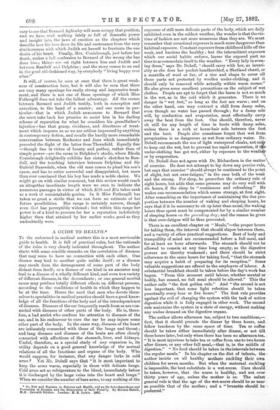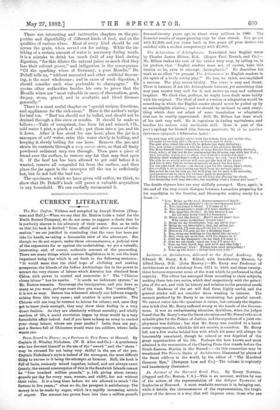A GUIDE TO HEALTH.*
To the unlearned in medical matters this is a most serviceable guide to health. It is full of practical rules, but the rationale of the rules is very clearly indicated throughout. The author starts with some sensible remarks on the correlation of diseases that may seem to have no connection with each other. One disease may lead to another quite unlike itself ; or a disease may result from the derangement of some part of the body distant from itself; or a disease of one kind in an ancestor may lead to a disease of a wholly different kind, and even to a variety of different diseases, in the descendants ; or one general morbid cause may produce totally different effects on different persons, according to the conditions of health in which they happen to be at the time. Hence the need that men who devote them- selves to specialities in medical practice should have a good know- ledge of all the functions of the body and of the interdependence of diseases. Diseases of the ear frequently result from or are con- nected with diseases of other parts of the body. He is, there- fore, a bad anrist who confines his attention to diseases of the ear, and in his endeavour to cure the ear he may injure some other part of the body. In the same way, diseases of the heart are intimately connected with those of the lungs and throat ; and lung diseases and diseases of the brain are often closely connected with affections of the stomach, liver, and kidneys. Useful, therefore, as a special study of any organism is, its utility depends on a good general knowledge of the mutual relations of all the functions and organs of the body. Who would suppose, for instance, that any danger lurks in cold arms ? Yet Mr. Dobell says that " it is most important to keep the arms warm, especially in those with delicate lungs. Cold arms act as refrigerators to the blood, immediately before it is discharged by the large veins into the heart and lungs." When we consider the number of bare arms, to say nothing of the • On Diet and Regimen in Sickness and Health, and on the interdependence and Prevention of Diroasee and the Diminution of their Patati,y. By Horace Dobell, N.D. Eeventh Edition. London: H. S. Lewis. 1882. exposure of still more delicate parts of the body, which Div daily exhibited even in the coldest weather, the wonder is that thevic- tims of fashion are not more numerous than they are. We must remember that occasional exposure is much more dangerous than habitual exposure. Constant exposure from childhood kills off the weak, and hardens the healthy ; but the intermittent exposure which our social habits enforce, leaves the exposed part no time to accommodate itself to the weather. " Every lady in even- ing dress," says Dr. Dobell, " should carry with her, as invari- ably as she does her pocket-handkerchief, a Shetland shawl, or a mantilla of wool or fur, of a size and shape to cover all those parts not protected by woollen under-clothing, and it should only be removed while actually within warm rooms." He also gives some excellent precautions on the subject of wet clothes. People are apt to forget that the harm is not so much in the wet, as in the cold which it generates. There is no danger in " wet feet," so long as the feet are warm ; and on the other -hand, one may contract a chill from damp soles, even though no water has passed through ; for a damp sole will, by conduction and evaporation, most effectually carry away the heat from the foot. One should, therefore, never sit still for any length of time in boots with damp soles, unless there is a cork or horse-hair sole between the foot and the boot. People also sometimes forget that wet from perspiration is as dangerous as wet from ordinary water. D Dobell recommends the use of light waterproof cloaks, not o to keep out the wet, but to prevent too rapid evaporation, if t under-clothing has got wet, either by exposure to the weath or by evaporation.
Dr. Dobell does not agree with Dr. Richardson in the matter of exercise. He does not attempt to lay down any precise rule, but says that exercise " should always be continued to the point of slight, but not over-fatigue," in the case both of the weak and the strong. For sleep, he prescribes the ordinary rule of eight hours, but adds that some persons may do very well with six hours, if the sleep be " continuous and refreshing." He makes one recommendation which seems strange, at first sight. After remarking on the importance of maintaining the due pro- portion between the number of waking and sleeping hours, he says that if it be necessary to sit up later than usual, the waking hours thus spent must be compensated for by a similar number of sleeping hours on the preceding day; and the reason he gives is that over-fatigue will be thus prevented.
There is an excellent chapter on " Meals,"—the proper hours for taking them, the interval that should elapse between them, and a variety of other practical suggestions. Rest of body and tranquillity of mind are recommended before a full meal, and for at least an hour afterwards. The stomach should not be allowed to remain at any time long empty, as the digestive powers are thereby weakened ; and there should be strict adherence to the same hours for taking food, " that the stomach may acquire a habit of preparing for its reception." Some valuable suggestions are offered to the employers of labour. A substantial breakfast should be taken before the day's work has begun. " From this moment until labour, whether mental or bodily, has ceased, no full meal should be allowed." This the author calls "the first golden rule." And "the second is not less important, that some light refection should be taken punctually every four or five hours." The first rule provides against the evil of charging the system with the task of active digestion while it is fully engaged in other work. The second rule maintains the system in a state of energy, without making any undue demand on the digestive organs.
The author allows afternoon tea, subject to two conditions,— first, that it should precede the dinner by three hours, and - follow luncheon by the same space of time. Tea or coffee should be taken either immediately after dinner,, or not till three hours later, but only when there has been no afternoon tea. " It is most injurious to take tea or coffee from one to two hours after dinner, or any other full meal,—that is, in the middle of digestion." " No food should be taken in the intervals between the regular meals." In his chapter on the diet of infants, the author insists on all healthy mothers suckling their own children for seven months. But when the maternal suckling is impossible, the best substitute is a wet-nurse. Care should be taken, however, that the nurse is healthy, and not over thirty years of age, unless the mother is so. The safest general rule is that the age of the wet-nurse should be as near as possible that of the mother; and a " brunette should be preferred." There are interesting and instructive chapters on the pro- perties and digestibility of different kinds of food, and on the qualities of various wines. Meat of every kind should be cut across the grain, when served out for eating. While the im- bibing of a certain amount of water is necessary during meals, it is a mistake to drink too much fluid of any kind during digestion, "for this dilutes the natural juices so much that they lose their solvent power," and indigestion is the consequence. "Of the sparking wines of Germany, a pure Moselle," Dr. Dobell tells us, " without muscated and other artificial flavour- ing, is the most wholesome ; and in cases of weak digestion, I should consider such wine preferable to champagne." He quotes other authorities besides his own to prove that the Moselle wines are "most valuable in cases of rheumatism, gout, dropsy, stone, gravel, and in scorbutic and blood diseases generally."
There is a most useful chapter on " special recipes, directions, and appliances for the sick-room." Here is the author's recipe for beef tea. " Beef tea should not be boiled, and should not be drained through a fine sieve or muslin. It should be made as follows :—Take of rumpsteak, free from fat and minced, 1 lb., .cold.water 1 pint, a pinch of salt ; put them into a jar, and tie it down. After it has stood for one hour, place the jar in a saucepan of cold water, raise this water slowly to boiling, and keeping it slowly boiling for one hour. Remove the jar, and strain its contents through a very coarse sieve, so that all finely powdered sediment may run through. Then pass a piece of bread over the surface, to remove any fat that may float upon it. If the beef tea has been allowed to get cold before it is wanted, remove all congealed fat from the surface, and then place the jar again in the saucepan till the tea is sufficiently hot, but do not boil the beef tea."
The specimens which we have given will suffice, we think, to show that Dr. Dobell's book will prove a valuable acquisition in any household. We can cordially recommend it.



































 Previous page
Previous page